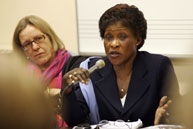Children at war
Panel explores Ugandan horror
Imagine a war in which abducted children are the soldiers and their families are the victims. Imagine a country in which more than a million people live in displacement camps in order to protect themselves from the vicious leader of an army claiming to be adherents of the Ten Commandments. This horrific scenario is being played out in Northern Uganda, where the Lord's Resistance Army (LRA), a rebel paramilitary group, has been committing these and other atrocities for almost two decades.

The Ugandan people crave peace, says Betty Bigombe, who in 1994 mediated talks between Ugandan authorities and a rebel paramilitary group.
Owen Egan
On Oct. 23, the Faculty of Religious Studies sponsored a panel discussion on Uganda, timed to coincide with this year's release of the Canadian documentary about the conflict, Uganda Rising.
Looking to overthrow the Ugandan government, the charismatic Joseph Kony founded the LRA in 1987. Initially, the rebels proved to be more a nuisance than a threat to civilians, raiding villages for supplies. As the government took action to snuff out the rebellion, the LRA's actions became more brutal. They kidnapped children, trained them as soldiers and forced them to kill friends, family and members of their own communities. "There are rules of war," said former United Nations Deputy Secretary-General Louise Frechette during the McGill panel. "Whether you're weak or strong, taking it out on civilians is not acceptable."
In spite of the Ugandan government's offer of amnesty to child soldiers, the conflict went unresolved and the atrocities continued. In 2005, the International Criminal Court issued arrest warrants for Joseph Kony and other rebel leaders of the LRA, which spurred rebel leaders to vow to continue their campaign of terror until the warrants were dropped.
Panelist Betty Bigombe, who mediated the 1994 talks between the Ugandan government and the LRA, maintained that the warrants should be put on hold in the name of peace. "There is a great craving for peace," she said. "If it is justice [for Kony] at the cost of peace, then we'd rather have that peace." Franziska Baltzer from McGill's Department of Pediatrics agreed, using an analogy from rehabilitation of abuse victims: "The most important thing that starts the healing process is stopping the abuse."
The situation is further complicated by the fact that the abducted children are both the victims and the perpetrators of violence. Returned soldiers find it difficult to integrate back into society and it is not easy for their communities to forgive them for the crimes they may have committed under orders. "Forgiveness is very personal," said Bigombe, "and traditional justice — accountability, truth and compensation — might not always reach the heart and soul of people who have borne the brunt of the situation."

